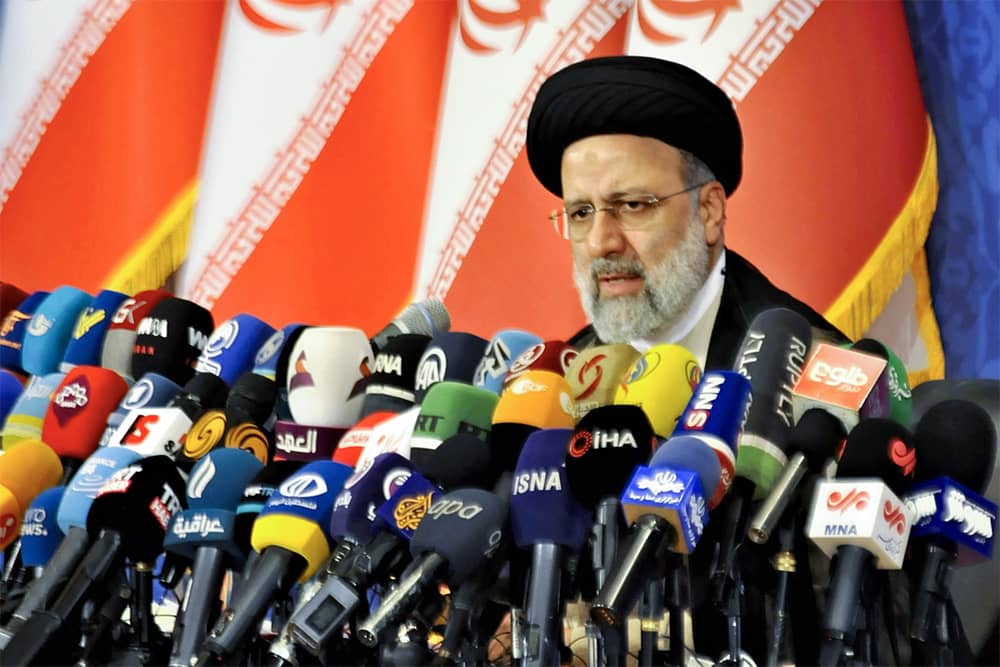The talks between Iran and the permanent five Security Council members plus Germany appear to be floundering. Notwithstanding the eagerness of the Biden Administration to reach an agreement with Iran to revive the Joint Comprehensive Plan of Action (JCPOA, known as the Iran nuclear deal), Tehran has not been in the least forthcoming. Iranian President Ebrahim Raisi has insisted that Washington and its allies lift all sanctions that they have imposed on Iran as a condition for an agreement. Moreover, Raisi has made it clear that contrary to the Biden team’s public assurances – that there would be follow-on talks to address both Iran’s missile program and its nefarious operations throughout the Middle East – he has no intention of engaging in any such dialogue.
In the meantime, Iran’s nuclear program continues apace. It has enriched over 17 kilograms of uranium to the sixty per cent level, enabling it to further enrich uranium 235 to the weapons grade 90 per cent level, and to do so more quickly. Analysts are predicting that at the program’s current rate of enrichment, Iran could in theory have enough fissile material for one or more nuclear weapons available in a matter of weeks, not months, and certainly not years.
Raisi has little incentive to conclude an agreement of any kind with the West and especially with Washington. He surely recognizes that the Biden Administration cannot unilaterally nullify sanctions imposed by the Congress, even if it can drop those that President Trump initiated. In addition, and perhaps far more important, any new agreement could jeopardize Raisi’s chances of replacing Ali Khamenei as Iran’s Supreme Leader. Successful conclusion of a deal would have the Biden Administration popping champagne corks in celebration. On the other hand, and for precisely that reason, Raisi might find himself under attack from rivals who would claim he capitulated to the Americans.
In the absence of an agreement, it might be possible to “kick the can down the road” by extending negotiations for a year or more, on condition that Iran not further enrich its uranium stockpile. Even if both sides reach such an understanding, it is imperative that the United States not cut back on the sanctions that President Trump imposed in what he termed a program of “maximum pressure.” Clearly, these sanctions have not prevented Iran’s expansion of its weapons program, but their removal would certainly make it that much easier for Tehran to achieve its nuclear ambitions.
At the same time, however, the Biden Administration must not allow itself to become enmeshed in an Israeli-initiated attack on Iran’s facilities. Indeed, it should continue to dissuade Israel from attempting to do so. To begin with, it is not at all clear that such an attack would succeed. Israel might not destroy all Iranian facilities, and even if it does, Iran might reconstitute them rapidly—perhaps with help from Russia, North Korea or China. It would likely then pursue its weapons program without any degree of restraint.
In addition, a war with Iran would likely destabilize the entire region, especially if Tehran assumes, as it likely might, that Saudi Arabia and Israel’s Abraham Accords partners in the Gulf — Bahrain and the United Arab Emirates — are parties to the Israeli attack. Iran could lash out at all three countries, at which point it would be exceedingly difficult for Washington to stand aloof. Moreover, the Abraham Accords might not survive a regional war, setting back Israel’s hopes for normalizing relations with additional Arab states, especially Saudi Arabia.
Washington has refocused its priorities and it now worries more about China’s aggressiveness in East Asia and Russian predations in Europe. But whatever its priorities, the Biden Administration cannot afford to allow another Middle Eastern conflagration to take place. Even if it does not reach a modified or renewed JCPOA with Iran, it must take all steps to ensure that, on the one hand, it maintains its pressure on Tehran to limit the expansion of its nuclear program and, on the other, it acts as a restraining force to preserve the region’s increasingly fragile stability.

